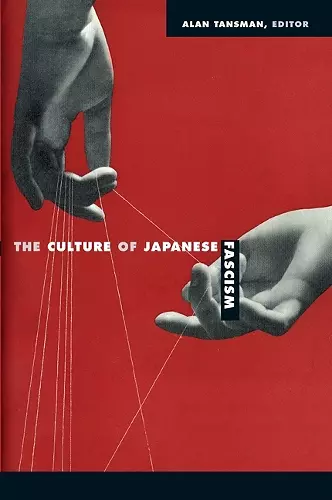The Culture of Japanese Fascism
Format:Paperback
Publisher:Duke University Press
Published:13th Apr '09
Currently unavailable, and unfortunately no date known when it will be back

Focusing on Japan, scholars of history, literature, film, art history, and anthropology demonstrate the necessity of understanding fascism's cultural manifestations
Focusing on Japan, scholars of history, literature, film, art history, and anthropology demonstrate the necessity of understanding fascism s cultural manifestations.This bold collection of essays demonstrates the necessity of understanding fascism in cultural terms rather than only or even primarily in terms of political structures and events. Contributors from history, literature, film, art history, and anthropology describe a culture of fascism in Japan in the decades preceding the end of the Asia-Pacific War. In so doing, they challenge past scholarship, which has generally rejected descriptions of pre-1945 Japan as fascist. The contributors explain how a fascist ideology was diffused throughout Japanese culture via literature, popular culture, film, design, and everyday discourse. Alan Tansman’s introduction places the essays in historical context and situates them in relation to previous scholarly inquiries into the existence of fascism in Japan.
Several contributors examine how fascism was understood in the 1930s by, for example, influential theorists, an antifascist literary group, and leading intellectuals responding to capitalist modernization. Others explore the idea that fascism’s solution to alienation and exploitation lay in efforts to beautify work, the workplace, and everyday life. Still others analyze the realization of and limits to fascist aesthetics in film, memorial design, architecture, animal imagery, a military museum, and a national exposition. Contributors also assess both manifestations of and resistance to fascist ideology in the work of renowned authors including the Nobel-prize-winning novelist and short-story writer Kawabata Yasunari and the mystery writers Edogawa Ranpo and Hamao Shirō. In the work of these final two, the tropes of sexual perversity and paranoia open a new perspective on fascist culture. This volume makes Japanese fascism available as a critical point of comparison for scholars of fascism worldwide. The concluding essay models such work by comparing Spanish and Japanese fascisms.
Contributors. Noriko Aso, Michael Baskett, Kim Brandt, Nina Cornyetz, Kevin M. Doak, James Dorsey, Aaron Gerow, Harry Harootunian, Marilyn Ivy, Angus Lockyer, Jim Reichert, Jonathan Reynolds, Ellen Schattschneider, Aaron Skabelund, Akiko Takenaka, Alan Tansman, Richard Torrance, Keith Vincent, Alejandro Yarza
“So can a volume focused on the cultural aspects of a primarily political concept succeed? Yes, indeed. This book offers a wealth of fresh information on the era of fascism in Japan, ranging from the ‘high road’ of intellectual history and literary studies to more accessible insights on the role of dogs and propaganda lies about Pearl Harbour. . . . [An] excellent study of fascist Japan.” - Lawrence Fouraker, Itinerario “[T]he essays in this collection provide informative perspectives on topics such as literature, film, architectural design, exhibitions and popular culture. . . .” - Roger Brown, Social Science Japan Journal “Alan Tansman deserves tremendous credit for bringing together this multidisciplinary group of scholars to deal with an issue conspicuously neglected by the majority of scholars in Japan studies. . . . The publication of this insightful set of essays in this volume is without question an important contribution to our understanding of a culture of Japanese fascism as a local manifestation of a truly international political and cultural phenomenon.” - Walter Skya, Journal of Japanese Studies “An extremely provocative and stimulating collection of essays, The Culture of Japanese Fascism canvasses a wide array of cultural forms-movies, novels, religious rites, material culture, monuments, and architecture-to show the ways that fascist aesthetics saturated a dispersed cultural field. By focusing on thought and culture, it helps us rethink the turn from modernism to fascism, to understand fascism’s effects on everyday life, and to reconsider the reigning conceptions of fascist ideology.”-Louise Young, author of Japan’s Total Empire: Manchuria and the Culture of Wartime Imperialism “These rich and varied essays provide a fascinating, if unsettling, depiction of the seductive appeal of fascist culture. They also show how much Japan shared with Europe in its aesthetic responses to the crisis of modernity in the interwar years. An important contribution in every respect.”-Carol Gluck, Columbia University “[T]he essays in this collection provide informative perspectives on topics such as literature, film, architectural design, exhibitions and popular culture. . . .” - Roger Brown (Social Science Japan Journal) “Alan Tansman deserves tremendous credit for bringing together this multidisciplinary group of scholars to deal with an issue conspicuously neglected by the majority of scholars in Japan studies. . . . The publication of this insightful set of essays in this volume is without question an important contribution to our understanding of a culture of Japanese fascism as a local manifestation of a truly international political and cultural phenomenon.” - Walter Skya (Journal of Japanese Studies) “So can a volume focused on the cultural aspects of a primarily political concept succeed? Yes, indeed. This book offers a wealth of fresh information on the era of fascism in Japan, ranging from the ‘high road’ of intellectual history and literary studies to more accessible insights on the role of dogs and propaganda lies about Pearl Harbour. . . [An] excellent study of fascist Japan.” - Lawrence Fouraker (Itinerario)
ISBN: 9780822344681
Dimensions: unknown
Weight: 708g
496 pages